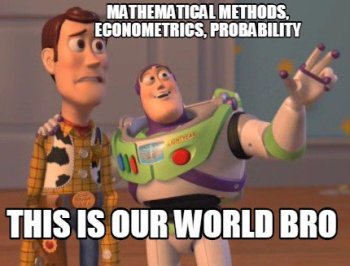From Lars Syll Our admiration for technical virtuosity should never blind us to the fact that we have to have a cautious attitude towards probabilistic inferences in economic contexts. Science should help us disclose causal forces behind apparent ‘facts.’ We should look out for causal relations, but econometrics can never be more than a starting point in that endeavour since econometric (statistical) explanations are not explanations in terms of mechanisms, powers, capacities or causes. Firmly stuck in an empiricist tradition, econometrics is only concerned with the measurable aspects of reality, But there is always the possibility that there are other variables – of vital importance and although perhaps unobservable and non-additive, not necessarily epistemologically inaccessible –
Topics:
Lars Pålsson Syll considers the following as important: Uncategorized
This could be interesting, too:
tom writes The Ukraine war and Europe’s deepening march of folly
Stavros Mavroudeas writes CfP of Marxist Macroeconomic Modelling workgroup – 18th WAPE Forum, Istanbul August 6-8, 2025
Lars Pålsson Syll writes The pretence-of-knowledge syndrome
Dean Baker writes Crypto and Donald Trump’s strategic baseball card reserve
from Lars Syll
 Our admiration for technical virtuosity should never blind us to the fact that we have to have a cautious attitude towards probabilistic inferences in economic contexts. Science should help us disclose causal forces behind apparent ‘facts.’ We should look out for causal relations, but econometrics can never be more than a starting point in that endeavour since econometric (statistical) explanations are not explanations in terms of mechanisms, powers, capacities or causes. Firmly stuck in an empiricist tradition, econometrics is only concerned with the measurable aspects of reality, But there is always the possibility that there are other variables – of vital importance and although perhaps unobservable and non-additive, not necessarily epistemologically inaccessible – that were not considered for the model. Those who were can hence never be guaranteed to be more than potential causes, and not real causes. A rigorous application of econometric methods in economics really presupposes that the phenomena of our real world economies are ruled by stable causal relations between variables. A perusal of the leading econom(etr)ic journals shows that most econometricians still concentrate on fixed parameter models and that parameter-values estimated in specific spatio-temporal contexts are presupposed to be exportable to totally different contexts. To warrant this assumption one, however, has to convincingly establish that the targeted acting causes are stable and invariant so that they maintain their parametric status after the bridging. The endemic lack of predictive success of the econometric project indicates that this hope of finding fixed parameters is a hope for which there really is no other ground than hope itself.
Our admiration for technical virtuosity should never blind us to the fact that we have to have a cautious attitude towards probabilistic inferences in economic contexts. Science should help us disclose causal forces behind apparent ‘facts.’ We should look out for causal relations, but econometrics can never be more than a starting point in that endeavour since econometric (statistical) explanations are not explanations in terms of mechanisms, powers, capacities or causes. Firmly stuck in an empiricist tradition, econometrics is only concerned with the measurable aspects of reality, But there is always the possibility that there are other variables – of vital importance and although perhaps unobservable and non-additive, not necessarily epistemologically inaccessible – that were not considered for the model. Those who were can hence never be guaranteed to be more than potential causes, and not real causes. A rigorous application of econometric methods in economics really presupposes that the phenomena of our real world economies are ruled by stable causal relations between variables. A perusal of the leading econom(etr)ic journals shows that most econometricians still concentrate on fixed parameter models and that parameter-values estimated in specific spatio-temporal contexts are presupposed to be exportable to totally different contexts. To warrant this assumption one, however, has to convincingly establish that the targeted acting causes are stable and invariant so that they maintain their parametric status after the bridging. The endemic lack of predictive success of the econometric project indicates that this hope of finding fixed parameters is a hope for which there really is no other ground than hope itself.
Real world social systems are seldom governed by stable causal mechanisms or capacities. As Keynes wrote in My early beliefs:
The atomic hypothesis which has worked so splendidly in Physics breaks down in Psychics. We are faced at every turn with the problems of Organic Unity, of Discreteness, of Discontinuity – the whole is not equal to the sum of the parts, comparisons of quantity fails us, small changes produce large effects, the assumptions of a uniform and homogeneous continuum are not satisfied. Thus the results of Mathematical Psychics turn out to be derivative, not fundamental, indexes, not measurements, first approximations at the best; and fallible indexes, dubious approximations at that, with much doubt added as to what, if anything, they are indexes or approximations of.
The kinds of ‘laws’ and relations that econometrics has established, are laws and relations between entities in models that presuppose causal mechanisms being atomistic and additive. When causal mechanisms operate in real-world social target systems they only do it in ever-changing and unstable combinations where the whole is more than a mechanical sum of parts. If economic regularities obtain they do it (as a rule) only because we engineered them for that purpose. Outside man-made “nomological machines” they are rare, or even non-existent. Unfortunately, that also makes most of the achievements of econometrics – as most of the contemporary endeavours of mainstream economic theoretical modelling – rather useless.
